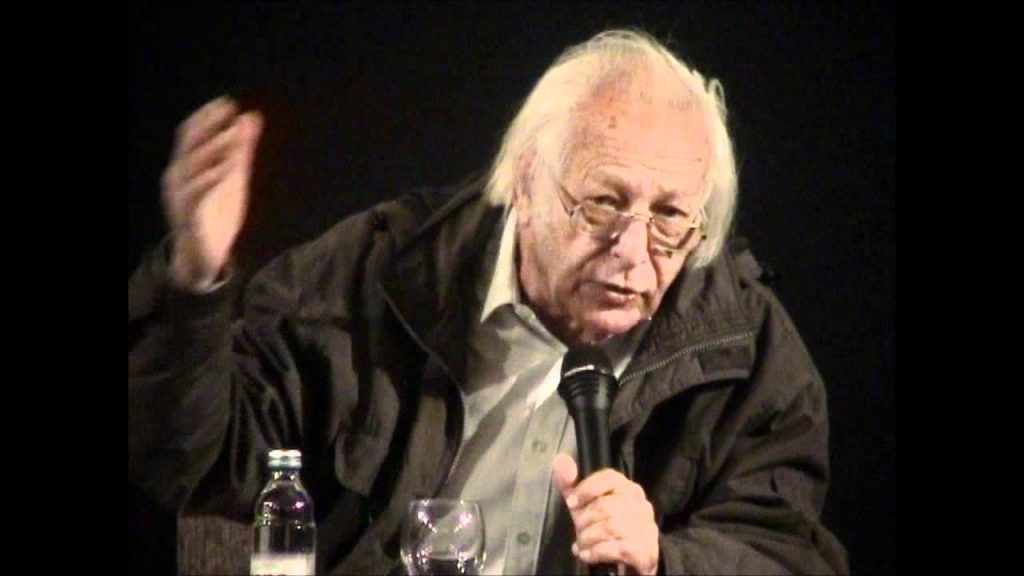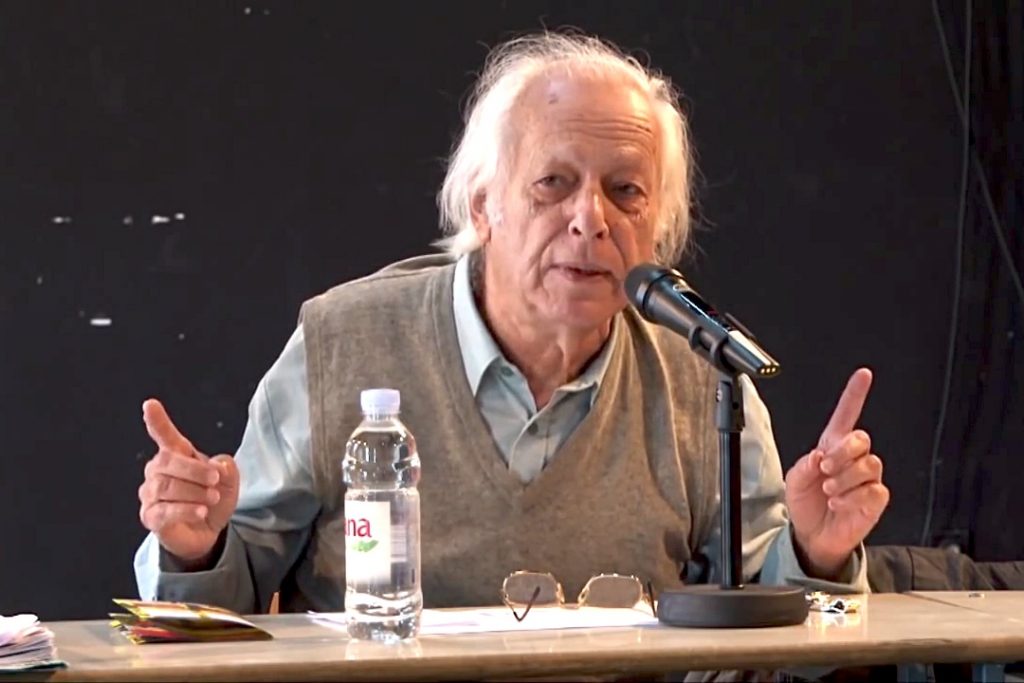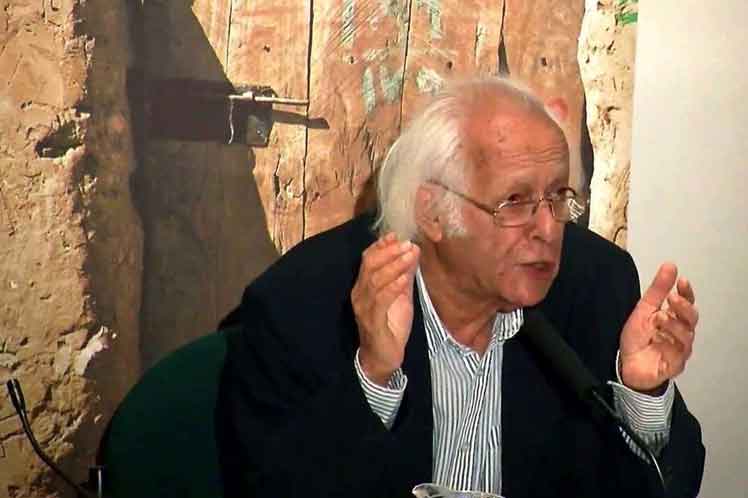
Samir Amin lives as long as peoples’ revolutionary journey moves forward. And, peoples’ revolutionary march is unending as revolutionary advancement opens path for further revolutionary advancement. Samir Amin walks along peoples struggling against exploitation, against imperialism in countries. Samir Amin transcends all borders capital creates to divide peoples struggling against exploiters, against all divisive politics, against all sectarian ideologies, which serve imperialism. Samir Amin stands for a modern life for peoples while opposes all backward ideas and ideologies serving exploiters.
Samir Amin breathed his last on August 12, 2018 (Sunday afternoon) in Paris from a brain tumor as reported by his colleague Cherif Salif on Linkedin. The revolutionary Marxist economist was 86. Samir Amin was hospitalized on July 21, and returned home on Saturday.
Samir Amin, one of the foremost Marxist theoreticians in contemporary world, was a communist. He was born in Egypt in 1931.
A long-standing activist, writer and one of closest associates of Monthly Review, the world famous independent socialist magazine, Samir Amin’s journey as a communist began in his school-days as he said in an interview:
“I considered myself a communist already at secondary school.” (“Revolutionary change in Africa: an interview with Samir Amin”, by Leo Zeilig of Review of African Political Economy (ROAPE), in Dakar on February 5, 2017)
He elaborated the point as he said:
“[W]e knew [to be a communist] meant […] equality between human beings and between nations, and […] this has been done by the Russian revolution, the Soviet Union. That was our definition […] at secondary school in Egypt […]” (ibid.)
Immediately after his secondary school, according to Samir Amin, he got in contact with the Communist Party in Egypt and he joined the Party. (ibid.)
And,
He has “been a communist since then.” (ibid.)
His “struggle in the Egyptian Communist Party between the Soviet line and the Maoist line […] compelled [him] to try to be rigorous and continuously on the frontline, politically and ideologically.” (ibid.)
Samir Amin said:
“I am active – action is the key.” (ibid.)
Samir Amin emphasizes the importance of struggle, and forcefully suggests swimming against the tide.
He was a member of the Communist Party of France during his time as a student in France.
His spending a substantial time in “militant action” allowed him least time to preparing for his university examinations. In France, he gained a diploma in political science (1952), and graduated in statistics (1956) and economics (1957).
On his return to Egypt, he remained a member of the Communist Party.
The Nasser’s years, according to Samir Amin, “was a very, very difficult time. [….] We had very strong arguments […] on the ground that the struggle was not just a national liberation struggle; it has to be associated with radical change on the road to socialism.” (ibid.)
Then, the communist party was divided. A small majority accepted the Soviet view of the non-capitalist road. But, Samir Amin was one of those who did not accept the road suggested by Moscow. A strong minority, perhaps 40%, did not accept that road. “And [he continued] to consider [himself] a communist.” (ibid.)
During his work in Egypt, Samir Amin witnessed from his position of work, “the public companies [were] being captured by a small tiny class, a kind of bourgeois caste, a corrupt class, including financing indirectly through their private enterprises.” (ibid.)
He “became even more radicalized.” In 1966, there was the Cultural Revolution in China. He supported the Cultural Revolution. Mao’s slogan – “Bombard the headquarters” – meant targeting the leadership of the communist party taking the capitalist road. (ibid.)
To Samir Amin, the only meaning of radicalism is to be anti-capitalist and be a socialist: “A socialist review should call upon […] people, not necessarily academics, who are directly involved in politics, in leadership of movements, social movements and parties and so on.” (ibid.)
He worked in Egypt, after completing university studies, and then in Mali, and then, at the head of Institut Africain de Développement Économique et de Planification (IDEP), and then as director of the Third World Forum in Dakar.
All through his work, he maintained a radical critique of society. “[O]therwise”, said Samir Amin, “none of those institutions [would] have been able to survive, succeed even, in doing many things. We have not changed the world but we have kept the flag flying, which is important also.” (ibid.)
Samir Amin, noted for introducing the term Eurocentrism in 1988, felt:
“[T]he challenge for all of us […] now is how we find the practical policies and strategies for progressive social change?
“I call it revolutionary advances, which means that we achieve revolutionary changes but which only create the possibility of later, further revolutionary advances.” (ibid.)
Samir Amin “reject[s] completely the naïve view that we can change the world without seizing political power; that is changing state power.” (ibid.)
“The power of the most advanced, the US today for example,” said Samir Amin, “cripples the developments of a new society”. (ibid.)
His main contributions to radical theory have been in the field of international political economy.
Considering class struggle as one of the basic questions in interpreting political issues is one of Samir Amin’s world view.
Samir Amin considers theories and interpretations useless that don’t challenge the “sacred” character of property, legitimizes inequality and the prerequisites of capitalist reproduction, and empowers the property owners.
Samir Amin said about delinking. Delinking, according to Samir Amin, is a principle of strategy: Instead of adjusting to the needs of capitalist, global expansion, the pattern has to be broken. [….] It means rejecting the logic of unilateral adjustment to the needs of further capitalist and imperialist expansion, and trying to reverse the relation and focus on projects of development ourselves.” (ibid.)
He says:
“[I]f we start, we will succeed, that we will compel imperialists to accept it and that would create a logic, a possibility of further advances.” (ibid.)
So, Samir Amin suggests: You try to succeed, as far as possible, to have your own strategy, independent of the trends of the unequal global system. (ibid.)
Samir Amin opines: If the delinking is led by bourgeois forces, it will never go beyond a small class, however, if it is a process powered by popular forces, it will lead to other questions, namely industrialization and reviving peasant agriculture, as a means of having, ensuring food. It’s more than security, sovereignty, and having policies, economic policies including control of foreign capital. This might not mean that you reject completely foreign capital, but you control it.
He terms this program as a sovereign popular national project for African countries.
Samir Amin views globalization as an extension of capitalist imperialism. So, he calls attention to capitalist-imperialist globalization controlled by financial monopoly capital, by a set of imperialist countries – principally the triad: the US, Western Europe and Japan. They are strong enough to control the processes of economic life and production and also political life at a global level. (ibid.)
He suggests getting out of this globalization.
His suggested sovereign popular national project for Africa will be national, but, not nationalist; will mean change of political power. He considers change of political power can’t be done at global level or even at a regional level before being changed at national level. It will not be a bourgeois, capitalist project. The required steps cannot be achieved while accepting the pattern of globalization and capitalism.
In works including Accumulation on a World Scale, and Maldevelopment, Samir Amin argues against neo-classical economics from a class perspective.
He was active in different places including the Third World Forum, the World Forum of Alternatives and the Arab Centre of Research.
Optimistic about class struggle, Samir Amin provides excellent critiques of the effects of imperialism. He strongly denounces compradors and charlatans, and their loot.
John Bellamy Foster, editor, Monthly Review, writes:
Amin’s wide-ranging work can be most succinctly described in terms of the dual designation of The Law of Value and Historical Materialism — the title of one of his books, now in a new edition as The Law of Worldwide Value. Marx’s intellectual corpus, he notes, appears to be divided into writings on economics and writings on politics. (“Samir Amin at 80: An Introduction and Tribute”, Monthly Review, October 2011)
Samir Amin, according to Foster,
“insists that the economic laws of capitalism, summed up by the law of value, ‘are subordinate to the laws of historical materialism.’
“Economic science, while indispensable, cannot explain at the highest level of abstraction, as in mathematical equations, the full reality of capitalism and imperialism — since it cannot account either for the historical origins of the system itself, or for the nature of the class struggle. Nor indeed can it present in a strictly determinant fashion the contemporary historical manifestation of the law of value, expressed as the theory of ‘globalized value,’ which requires recognition of such factors as monopoly power and unequal exchange. At best we can see value relations as historically ‘transformed’ in ways that are less determinant than in the abstract models based on a freely competitive economy, but which are still subject to meaningful political-economic analysis.”
Foster writes:
“In Amin’s analysis, then, the law of value and historical materialism do not have equal standing — if only because the former offers the world no way out, while the latter does.
“In his own words, Amin’s analysis of ‘the history of capitalism meshes with the conclusions that Baran, Sweezy, Magdoff (and following them, the Monthly Review team) have drawn from their precocious analysis of monopoly capitalism.’”
The Monthly Review editor writes:
“The theory of worldwide value is Amin’s signal economic contribution, summing up as it does the system of unequal exchange/imperial rent that divides the global North and the global South.”
Foster cites Samir Amin:
“Capitalism only adapts to the exigencies of the unfolding of struggles and conflicts that form its history at the price of accentuating its character as destroyer of the bases of its wealth — human beings (reduced to the status of labor force/commodity) and nature (reduced in the same way to commodity status). Its first long crisis (begun in 1873) paid off with thirty years of wars and revolutions (1914–1945). Its second (begun in 1971) entered the second, necessarily chaotic, stage of its [own] unfolding with the financial collapse of 2008, bringer of horrors and destructions that henceforth are a menace to the whole human race. Capitalism has become an obsolete social system.”
Citng Samir Amin;s The Law of Worldwide Value, and Eurocentrism, Foster writes:
“If we are to come out in the end from this ‘long tunnel,’ [Samir Amin] declares, it will be into socialism…a society aimed at transcending ‘the legacy of unequal development inherent to capitalism’ by offering to ‘all human beings on the planet a better mastery of their social development’—in line with ecological requirements.”
Works by Samir Amin
Samir Amin’s works are important for understanding the present imperialist world order, inequalities at world scale, and capitalist structures, a few of which include:
Accumulation on A World Scale, Monthly Review Press (henceforth MR Press), New York, 1974, The Law of Value and Historical Materialism, MR Press, 1978, The Law of Worldwide Value, MR Press, 2010, Imperialism and Unequal Development, MR Press, 1977, Class and Nation, Historically and in the Current Crisis, MR Press, 1980, Eurocentrism, MR Press, 1989, Capitalism in the Age of Globalization, Zed Books, London, 1997, Obsolescent Capitalism, Zed Books, 2003, Neocolonialism in West Africa, Unequal Development: An Essay on the Social Formations of Peripheral Capitalism, (with G. Arrighi, A. G. Frank and I. Wallerstein), La crise, quelle crise? (Crisis, what crisis?), Transforming the world-economy? : nine critical essays on the new international economic order, (Andre Gunder Frank, Giovanni Arrighi and Immanuel Wallerstein), Transforming the revolution: social movements and the world system, L’Empire du chaos (Empire of Chaos), Empire of Chaos, Spectres of capitalism: a critique of current intellectual fashions, The Liberal Virus: Permanent War and the Americanization of the World, Beyond US Hegemony: Assessing the Prospects for a Multipolar World, (with James Membrez), The World We Wish to See: Revolutionary Objectives in the Twenty-First Century, Eurocentrism – Modernity, Religion and Democracy: A Critique of Eurocentrism and Culturalism, Ending the Crisis of Capitalism or Ending Capitalism?, Maldevelopment – Anatomy of a Global Failure, Imperialsim and Globalization, The Implosion of Contemporary Capitalism, Russia and the Long Transition from Capitalism to Socialism.
The communist, who began journey from the land of the Nile, upholds the standard of the revolutionary proletariat through his life and activism. The world proletariat recollects his role as a comrade, as a fighter.
Farooque Chowdhury writes from Dhaka.









































